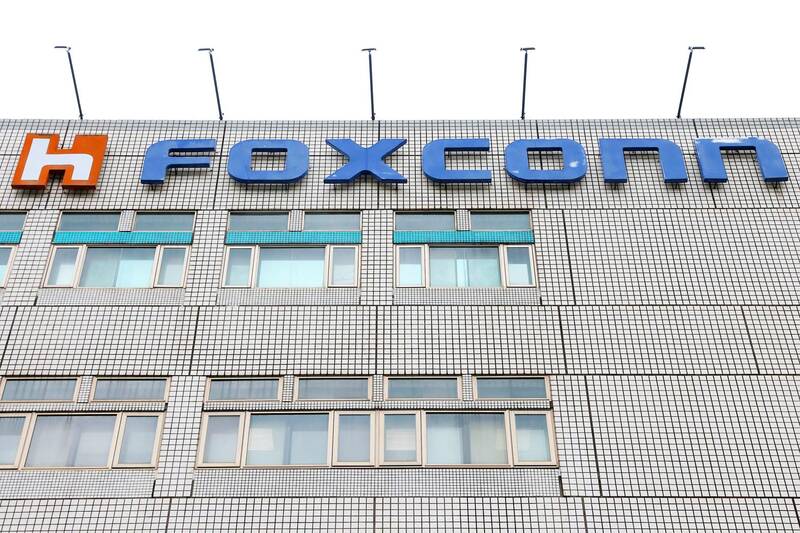The lockdown of Foxconn Technology Group’s (富士康科技集團) Zhengzhou factory, which is the world’s largest producer of iPhones, has highlighted some of the risks of relying on China’s manufacturing sector amid its ‘zero COVID’ policies, analysts said.
Foxconn — known as Hon Hai Precision Industry Co (鴻海精密) in Taiwan and Apple Inc’s principal subcontractor — has seen a surge in COVID-19 cases at its Zhengzhou site, leading the company to lock down the vast complex in a bid to keep the virus in check.
Images soon after emerged of panicking workers fleeing the site on foot in the wake of allegations of poor conditions at the facility, which has hundreds of thousands of employees.

Photo: Carlos Garcia Rawlins, Reuters
Foxconn is China’s largest private-sector employer, with more than 1 million people working across the country in about 30 factories and research institutes.
However, Zhengzhou is the Taiwanese giant’s crown jewel, churning out iPhones in quantities not seen anywhere else.
“In a normal situation, almost all the iPhone production is happening in Zhengzhou,” Counterpoint analyst Ivan Lam (林科宇) said.
Apple manufactures more than 90 percent of its products in China, which is also one of its most important markets.
“For Apple, it is once again a bad example in terms of the stability of production chains,” Natixis SA Asia-Pacific manager Alicia Garcia Herrero said.
The company’s heavy dependence on China “brings potential risks, especially when the US-China trade war shows no signs of de-escalating,” consulting firm Dezan Shira and Associates said.
Opened in 2010, the Zhengzhou factory employs up to 300,000 people who live on-site throughout the year, creating a sprawling tech hub known as “iPhone city.”
It is made up of three factories, one of which produces the iPhone 14 — Apple’s newest handset model.
Lam said that the partial stopping of work at the site resulted in a loss of “10 to 30 percent” of output, adding that part of the production has been temporarily moved to other Foxconn sites in China.
The site is currently operating a “closed loop” with the workers avoiding all contact with the outside world, while their daily bonuses have been quadrupled, Foxconn said.
“This incident may have a limited impact,” on worldwide iPhone production, said TF International Securities Group Co (天風國際證券) analyst Kuo Ming-chi (郭明錤), who specializes in Apple products.
“But suppliers in China must learn to improve closed-loop production efficiency in response to the ‘zero COVID’ policy,” he added.
China is the last major economy committed to a ‘zero COVID’ strategy, persisting with snap lockdowns, mass testing and lengthy quarantines in a bid to stamp out emerging outbreaks.
Highly transmissible variants have tested local officials’ ability to contain outbreaks faster than they can spread, causing much of the country to live under an ever-changing mosaic of COVID-19 restrictions.
Before the COVID-19 pandemic, Apple had begun outsourcing part of its production to India, and is considering Vietnam in a bid to wean itself off Chinese manufacturing. The pandemic accelerated the process.
The transition could take a while. Last year, nearly 7.5 million iPhones were made in India, just 3 percent of Apple’s total production.
“Increasing the capacity of factories [in India] is difficult,” Lam said.

‘SHORT TERM’: The local currency would likely remain strong in the near term, driven by anticipated US trade pressure, capital inflows and expectations of a US Fed rate cut The US dollar is expected to fall below NT$30 in the near term, as traders anticipate increased pressure from Washington for Taiwan to allow the New Taiwan dollar to appreciate, Cathay United Bank (國泰世華銀行) chief economist Lin Chi-chao (林啟超) said. Following a sharp drop in the greenback against the NT dollar on Friday, Lin told the Central News Agency that the local currency is likely to remain strong in the short term, driven in part by market psychology surrounding anticipated US policy pressure. On Friday, the US dollar fell NT$0.953, or 3.07 percent, closing at NT$31.064 — its lowest level since Jan.

The US dollar was trading at NT$29.7 at 10am today on the Taipei Foreign Exchange, as the New Taiwan dollar gained NT$1.364 from the previous close last week. The NT dollar continued to rise today, after surging 3.07 percent on Friday. After opening at NT$30.91, the NT dollar gained more than NT$1 in just 15 minutes, briefly passing the NT$30 mark. Before the US Department of the Treasury's semi-annual currency report came out, expectations that the NT dollar would keep rising were already building. The NT dollar on Friday closed at NT$31.064, up by NT$0.953 — a 3.07 percent single-day gain. Today,

The New Taiwan dollar and Taiwanese stocks surged on signs that trade tensions between the world’s top two economies might start easing and as US tech earnings boosted the outlook of the nation’s semiconductor exports. The NT dollar strengthened as much as 3.8 percent versus the US dollar to 30.815, the biggest intraday gain since January 2011, closing at NT$31.064. The benchmark TAIEX jumped 2.73 percent to outperform the region’s equity gauges. Outlook for global trade improved after China said it is assessing possible trade talks with the US, providing a boost for the nation’s currency and shares. As the NT dollar

PRESSURE EXPECTED: The appreciation of the NT dollar reflected expectations that Washington would press Taiwan to boost its currency against the US dollar, dealers said Taiwan’s export-oriented semiconductor and auto part manufacturers are expecting their margins to be affected by large foreign exchange losses as the New Taiwan dollar continued to appreciate sharply against the US dollar yesterday. Among major semiconductor manufacturers, ASE Technology Holding Co (日月光), the world’s largest integrated circuit (IC) packaging and testing services provider, said that whenever the NT dollar rises NT$1 against the greenback, its gross margin is cut by about 1.5 percent. The NT dollar traded as strong as NT$29.59 per US dollar before trimming gains to close NT$0.919, or 2.96 percent, higher at NT$30.145 yesterday in Taipei trading